人教版高中英语必修 4 unit 4语法精讲精练--- 分词作定语和状语
- 格式:doc
- 大小:63.50 KB
- 文档页数:5
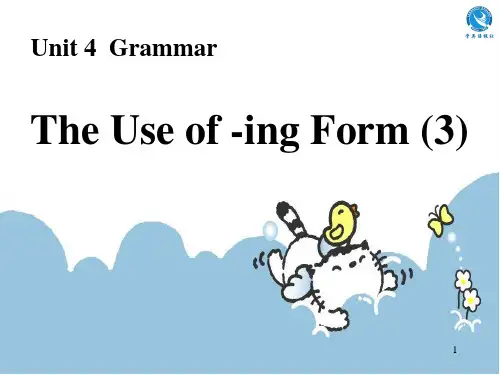
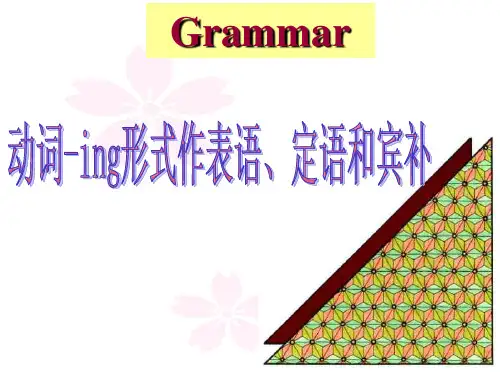
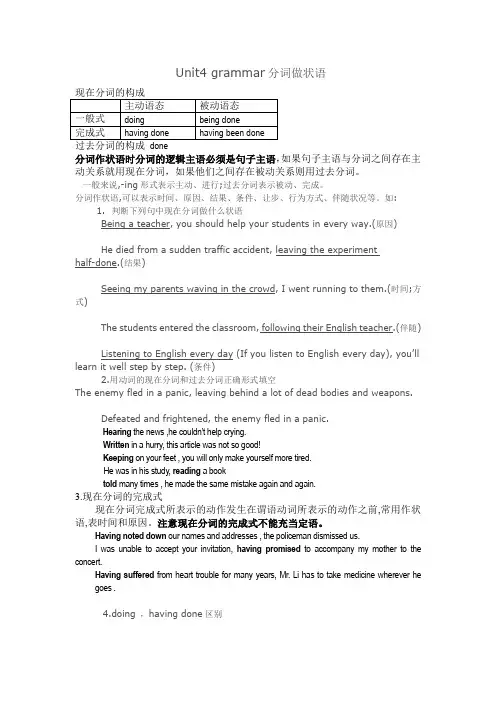
Unit4 grammar分词做状语分词作状语时分词的逻辑主语必须是句子主语,如果句子主语与分词之间存在主动关系就用现在分词,如果他们之间存在被动关系则用过去分词。
一般来说,-ing形式表示主动、进行;过去分词表示被动、完成。
分词作状语,可以表示时间、原因、结果、条件、让步、行为方式、伴随状况等。
如:1. 判断下列句中现在分词做什么状语Being a teacher, you should help your students in every way.(原因)He died from a sudden traffic accident, leaving the experimenthalf-done.(结果)Seeing my parents waving in the crowd, I went running to them.(时间;方式)The students entered the classroom, following their English teacher.(伴随)Listening to English every day (If you listen to English every day), you’ll learn it well step by step. (条件)2.用动词的现在分词和过去分词正确形式填空The enemy fled in a panic, leaving behind a lot of dead bodies and weapons.Defeated and frightened, the enemy fled in a panic.Hearing the news ,he couldn’t help crying.Written in a hurry, this article was not so good!Keeping on your feet , you will only make yourself more tired.He was in his study, reading a booktold many times , he made the same mistake again and again.3.现在分词的完成式现在分词完成式所表示的动作发生在谓语动词所表示的动作之前,常用作状语,表时间和原因。
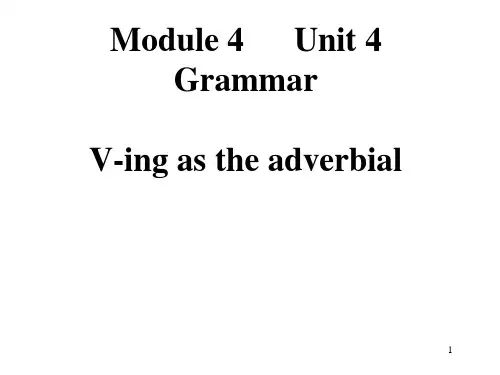
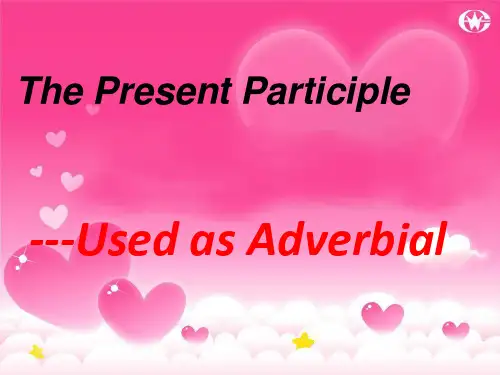
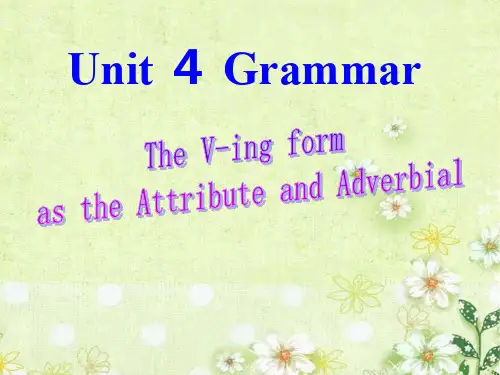
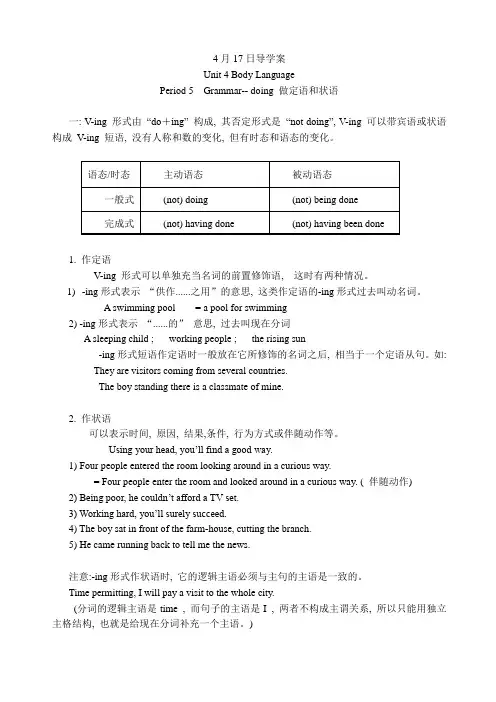
4月17日导学案Unit 4 Body LanguagePeriod 5 Grammar-- doing 做定语和状语一: V-ing 形式由“do+ing” 构成, 其否定形式是“not doing”, V-ing 可以带宾语或状语构成V-ing 短语, 没有人称和数的变化, 但有时态和语态的变化。
1. 作定语V-ing 形式可以单独充当名词的前置修饰语, 这时有两种情况。
1)-ing形式表示“供作......之用”的意思, 这类作定语的-ing形式过去叫动名词。
A swimming pool = a pool for swimming2) -ing形式表示“......的”意思, 过去叫现在分词A sleeping child ; working people ; the rising sun-ing形式短语作定语时一般放在它所修饰的名词之后, 相当于一个定语从句。
如:They are visitors coming from several countries.The boy standing there is a classmate of mine.2. 作状语可以表示时间, 原因, 结果,条件, 行为方式或伴随动作等。
Using your head, you’ll find a good way.1) Four people entered the room looking around in a curious way.= Four people enter the room and looked around in a curious way. ( 伴随动作)2) Being poor, he couldn’t afford a TV set.3) Working hard, you’ll surely succeed.4) The boy sat in front of the farm-house, cutting the branch.5) He came running back to tell me the news.注意:-ing形式作状语时, 它的逻辑主语必须与主句的主语是一致的。
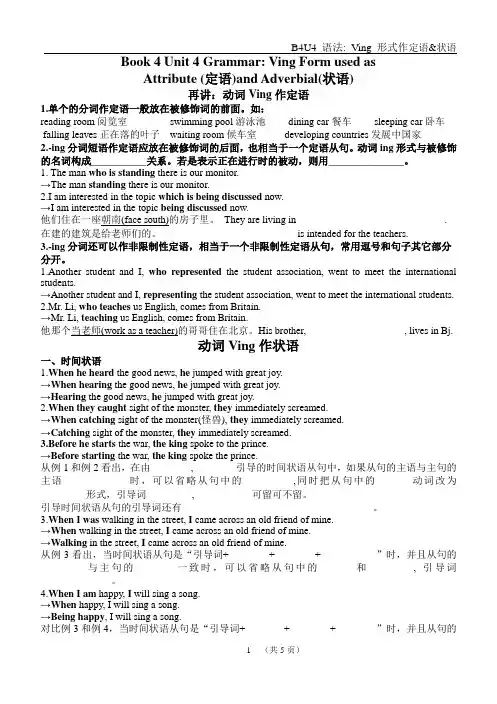
Book 4 Unit 4 Grammar: Ving Form used asAttribute (定语)and Adverbial(状语)再讲:动词Ving作定语1.单个的分词作定语一般放在被修饰词的前面。
如:reading room 阅览室swimming pool 游泳池 dining car 餐车 sleeping car 卧车falling leaves 正在落的叶子waiting room 候车室developing countries 发展中国家2.-ing分词短语作定语应放在被修饰词的后面,也相当于一个定语从句。
动词ing形式与被修饰的名词构成___________关系。
若是表示正在进行时的被动,则用_______________。
1. The man who is standing there is our monitor.→The man standing there is our monitor.2.I am interested in the topic which is being discussed now.→I am interested in the topic being discussed now.他们住在一座朝南(face south)的房子里。
They are living in _____________________________. 在建的建筑是给老师们的。
___________________________is intended for the teachers.3.-ing分词还可以作非限制性定语,相当于一个非限制性定语从句,常用逗号和句子其它部分分开。
1.Another student and I, who represented the student association, went to meet the international students.→Another student and I, representing the student association, went to meet the international students.2.Mr. Li, who teaches us English, comes from Britain.→Mr. Li, teaching us English, comes from Britain.他那个当老师(work as a teacher)的哥哥住在北京。

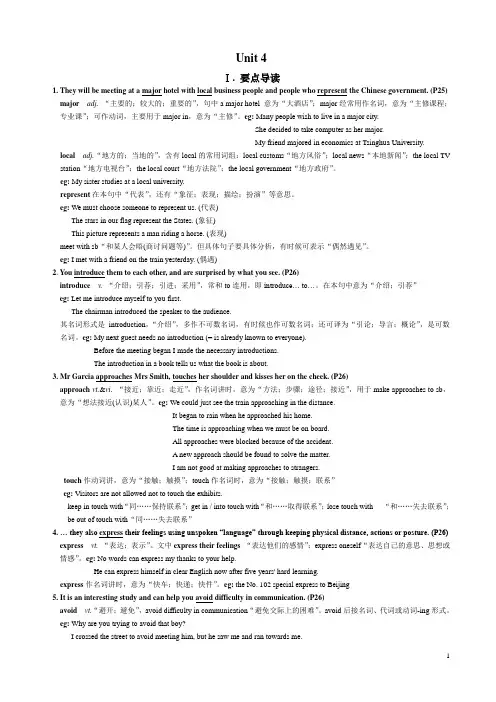
Unit 4Ⅰ. 要点导读1. They will be meeting at a major hotel with local business people and people who represent the Chinese government. (P25) major adj.“主要的;较大的;重要的”,句中a major hotel 意为“大酒店”;major经常用作名词,意为“主修课程;专业课”;可作动词,主要用于major in,意为“主修”。
eg: Many people wish to live in a major city.She decided to take computer as her major.My friend majored in economics at Tsinghua University.local adj.“地方的;当地的”,含有local的常用词组:local customs“地方风俗”;local news“本地新闻”;the local TV station“地方电视台”;the local court“地方法院”;the local government“地方政府”。
eg: My sister studies at a local university.represent在本句中“代表”,还有“象征;表现;描绘;扮演”等意思。
eg: We must choose someone to represent us. (代表)The stars in our flag represent the States. (象征)This picture represents a man riding a horse. (表现)meet with sb“和某人会晤(商讨问题等)”。
但具体句子要具体分析,有时候可表示“偶然遇见”。
eg: I met with a friend on the train yesterday. (偶遇)2. You introduce them to each other, and are surprised by what you see. (P26)introduce v.“介绍;引荐;引进;采用”,常和to连用,即introduce… to…。
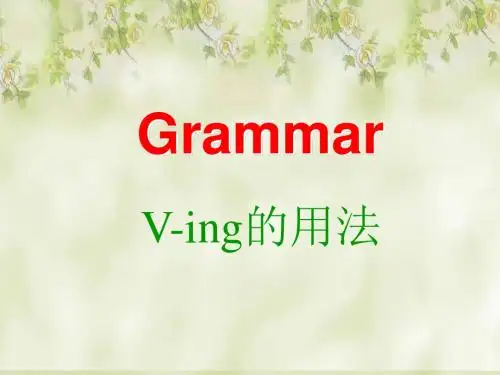
Book4 Unit4 Body language语法:v–ing 形式做定语和状语S tep1: Revision (the Ving form as the Attribute)1.In the ___ _(follow) years he worked even harder.2.Whether life will continue on the earth for millions of years___ _(come)will depend onwhether this problem can be solved.3.The wolf spoke in a ___ voice and Mr. Dongguo felt __ .(frighten)4.The __ _______ (shake) building showed that an earthquake was coming.5.__ _(bark) dogs seldom bite. =Dogs ____ _ seldom bite.6.But I woke when a little boy ran into m y ____ _(hide) place.【合作探究】:1.v-ing 作定语的位置:单个ing 做定语,位于名词的____ ; 短语作定语位于名词的___ .2.动名词作定语: 被修饰名词的____ 和_。
现在分词(ing)作定语:表示___ 动,所修饰名词正在进行的_ 或所处的_ 过去分词(done)作定语:表示___ 动,动作已经完成或所处的__ _3.to do 不定式作定语:表示将来The meeting to be held is of importance.Step2:Lead-in 寻规找矩:请找出下面句子中的v–ing form. 并说出分别充当什么成分。
1.Yesterday, another student and I, representing our university’s student association, went to theCapital International Airport to meet this year’s international students.2.She stepped back appearing surprised and put up her hands, as if in defence.3.When Darlene Coulon from France came dashing through the door, she recognized TonyGarcia’s smiling face.4.Just at that moment, however, Akira bowed so his nose touched George’s moving hand.5.They also express their feelings using unspoken language through physical distance.Step4: 现在分词作状语1.什么是状语?状语是指修饰谓语动词或整个句子的成分, 可以由单词、短语和从句充当,表示动作发生的时间、原因、结果、方式、条件、伴随状况等等。
必修 4 unit 4语法精讲-----分词作定语和状语一、作定语。
单个的分词作定语时放在所修饰词的前面,但是如果修饰some/any/no/every+thing/body/one 或者指示代词those时,分词应在其后。
分词短语作定语时应放在所修饰词的后面。
在用作定语时,分词在意思上接近一个定语从句。
The boring snow made the bored boys go home. (= The snow was boring, so the boys wee bored and went home.)注:现在分词与过去分词都可作定语,但现在分词表达的是正在进行的事情,有主动意义;而过去分词表示的是已完成的事情,有被动意义。
例如:I have no teeth left.Anyone swimming will be punished.The question being discussed in the meeting is very important.There are a lot of fallen leaves on the ground.二、作状语。
分词在句中作状语时表示动作发生的时间、原因、条件、结果或让步等,多置于句首,做伴随状语,多放在后面。
分词用于go doing结构中作目的状语。
分词短语作状语时,其逻辑主语必须与句子的主语一致。
如果与句子主语不一致,那么分词短语就需要有自己的逻辑主语,且要用独立主格结构形式来表达。
①时间状语:分词作时间状语相当于时间状语从句。
现在分词作时间状语一般位于句首,表示的动作和谓语动词的动作同时发生,有时现在分词前可以加上时间连词。
如果分词动作发生在谓语动词之前,用现在分词的完成体形式。
过去分词作时间状语与谓语动词构成同时性和被动意义。
分词前有时加上时间连词。
Arriving (=When he arrived) at the bus stop, he found his sister there.Waiting (=When I was waiting) to see the doctor, I met with a friend of mine.Having (=When we have) made full preparations, we are ready for an examination.Having (=When he had) finished his homework, he went to bed.After finishing his homework, he went to bed.Seen (=When the town is seen) from the hill, the town looks more beautiful.Locked (=When he was looked) up in the room, he found himself isolated from the outer world.When asked to make a speech, he said he was glad to do so.当请他作演讲时Once recovered, he will go all out to do his work.一旦康复②原因状语:分词作原因状语相当于原因状语从句。
一般位于句首。
Being (=Since he was) ill all last year, he lived in a sanatorium.There being no enough money, he couldn't buy the dictionary that he wanted. 由于没有钱Having (=Since they had) been asked to stay, they couldn't possibly leave right away.Moved (=As he was moved) by the heroic deeds of the PLA man, he burst into tears.③条件状语:通常用分词来表示,相当于条件状语从句。
一般位于句首。
Turning (=If you turn) to the left,you will see the post office.United (=If we are united), we stand; divided (=if we are divided), we fall.Given (=If he had been given) more time, he would be able to do better.④结果状语从句:现在分词作结果状语表示谓语动词的结果。
I ran faster than ever, reaching the schoolyard quite out of breath.The man died young, leaving nothing but debt.⑤让步状语:通常由过去分词来表示,而且前面通常有表示让步意义的though。
Though wounded, the soldier managed to get to the village safely.Though warned of the danger, he still went skating on the thin ice.⑥伴随或方式状语:分词作伴随状语通常位于句尾,表示谓语动词正在所处主动或被动的状态。
Chinese businessmen, taxi drivers and students talk with them using English.She came running towards us.They walked along the streets, talking and laughing.He went into the house, followed by some children.He continued to walk up and down, lost in thought.⑦there be 结构作状语多用there being结构,但若置于介词for之后要用there to beThere being nobody else at hand,I had to do by myself.由于附近没有人,我只得独自干了。
(原因状语)It’s too early for there to be anybody up.太早了,还不会有人起床。
(作程度状语)There having been no rain for a long time,the ground was very dry.因为好长时间没下雨了,地面非常干燥。
(原因状语)He sat in a chair,reading a novel. (一般式主动态)Being exhausted by work, he fell asleep quickly. (一般式被动态)Having finished his homework, he went playing. (完成式主动态)All this having been settled, he went home. (完成式被动态)“have+宾语+现在分词”表示主体使客体处于某状态或干什么事;“have+宾语+过去分词”表示动作是别人做的或与主体意志无关。
附表1-2.分词做定语的区别:三、考题引路1. ______ into English, the sentence was found to have an entirely different word order. (2011·天津卷)A. TranslatingB. TranslatedC. To translateD. Having translated【解析】本题中的分词短语作时间状语,且分词与the sentence之间是被动关系,故选B。
2. an important role in a new movie,Andy has a chance to become famous. (2011·四川卷)A.Offer B.Offering C.Offered D.To offer【解析】本题中的分词短语作原因状语,且分词与Andy之间是被动关系,故选C。
3. Sarah pretended to be cheerful,______nothing about the argument. (2011·全国II)A. says B: said C. to say D. saying【解析】本题中的分词短语作伴随状语,且分词与Sarah之间是主动关系,故选D。
4. The island,______to the mainland by a bridge, is easy to go to. (2011·全国II)A. joiningB. to joinC. joinedD. having joined【解析】本题中的分词短语作定语,相当于一个非限制性定语从句,且分词与The island 之间是被动关系,故选C。
5. More highways have been built in China,_______it much easier for people to trave from one place to another. (2011·陕西卷)A. makingB. madeC. to makeD. having made【解析】本题中的分词短语作结果状语,且分词与highways之间是主动关系,故选A。
6. Sit down, Emma. You will only make yourself more tired, on your feet. (2011·北京卷)A. to keepB. keepingC. having keptD. to have kept【解析】本题中的分词短语作条件状语,且分词与You之间是主动关系,故选B。
7. around the fire, the tourists danced with the local people. (2011·辽宁卷)A. GatherB. To gatherC. GatheringD. To be gathering【解析】本题中的分词短语作方式状语,且分词与the tourists之间是主动关系,故选C。